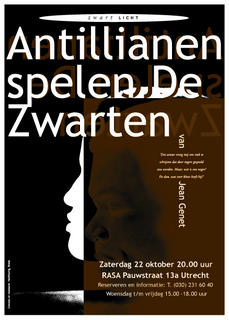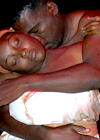
Wednesday I visited a debate on the treatment of minorities by the Chinese government.
Mrs Rebiya Kadeer (centre with picture) was one of the speakers that intrigued me a lot. This lady was a respected businesswomen in the autonomous region where the Uguir people lives. The Chinese government call her a terrorist. This because she stands for the right of her people to talk their own language, have their own religion, and educate their children the why they choose.

On August 22 we commemorated the Slave rebellion of the slaves in Curacao that started on August 17th, 1795. The main leader was known as Tula. One speaker at another commemoration stated that if Tula lived today, he would be called a terrorist. I'm sure that would happen. It happened to Mrs Kadir. The people in power decide which acts are terrorists ones, and which are official 'performance'. Mrs Kadeer was put into prison for her activities (as was Nelson Mandela, to mention just one). The Chinese rulers have the legal right to label her activities as terrorism, to judge her and they also imprisoned her. The same happened to the slave rebellion leader Tula. At the end he was killed. The Dutch colonial rulers in Curacao at that time had the right to call him a 'rioter', to judge him and his companions and to kill him, in a very cruel way.

I was impressed by Mrs Kadeer because of her stance. She stood there in De Balie in Amsterdam, using her own language (that had to be translated), made her statements and give examples of the things happening to her people back home. After she was released from prison this year she fleed to the US.
I hope I will have the strength and courage people like Mrs. Kadeer and Tula have, to stand for my the things I believe, even when the official rulers decide to call me a terrorist, which give them the right to punish, and at the end even kill me. Like they killed Tula.
China: The Next Generation - Forgotten minorities
Do China’s minorities celebrate? This evening you will be introduced to China's minorities. You will find out how Chinese authorities cope with minority-issues and will be informed first hand on the difficulties that these groups experience in their daily lifes.
Freedom of expression and religion continue to be a sensitive topic in China. The global war on terror has made the problems of minorities only harder. Besides Uighur human rights activists and exile community representatives, ITC (International Campaign for Tibet) and the UNPO (Organization of non Represented Peoples) will participate in this program.
Since the september 11 attacks in the United States, the Chinese authorities have used the global 'war on terrorism' to justify their crackdown on ethnic minorities who are pressing for greater autonomy over there historic regions. Arrests of so-called 'seperatists, terrorists and religious extremists' continue. Many of those charged with 'seperatist' or 'terrorist' offences face questionable trials and are reportedly sentenced to death.
One of the largest minorities - the Uighurs - live in Xinjiang Uighur Autonomous Region (XUAR), located in the Northwest of China. The region once made up the central portion of the legendary Silk Road. The Uighurs are Turkish speaking people and primarily Muslim. At the moment, millions of Chinese immigrants control the region politically, economically and culturally. The Uighurs are suffering unemployment, discrimination and restrictions on their religious and cultural freedoms. A problem similar to the situation Tibetans increasingly face.
Speakers:Uighur speaker:Mrs. Rebiya Kadeer, a prominent Uighur human rights activist.
ITC (International Campaign for Tibet) speaker:Tsering Jampa Executive Director ITC Europe
UNPO (Unrepresented Nations and Peoples Organization) speaker:Mr. Marino Busdachin General Secretary of the UNPO
In cooperation with:Amnesty Internationalprotest together with Amnesty on:
http://www.amnesty.nl/ITC (International Campaign for Tibet)
http://www.savetibet.org/UNPO (Unrepresented Nations and Peoples Organization)
http://www.unpo.org/Wednesday October 5th 20:30hrs 10 euro discount 8 euro 4 euro Int. Student Discount





